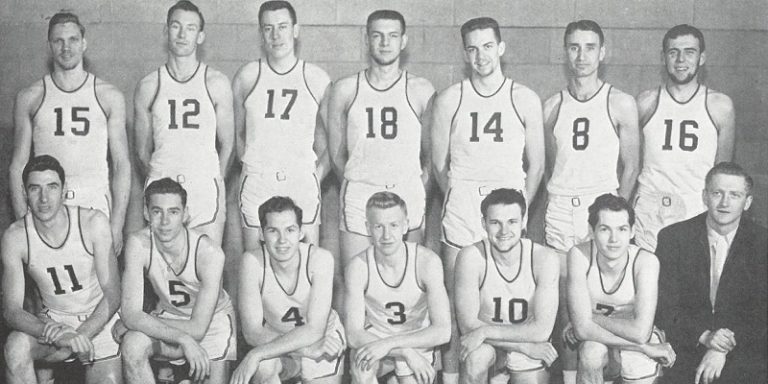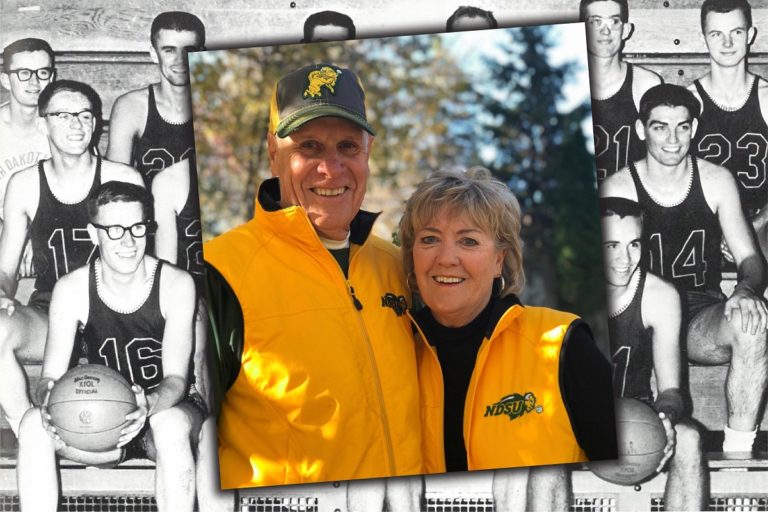Two photos in the home of Dale Peppel ’53 help tell the story of the role basketball played in shaping his childhood...
Read MoreA Privilege to Play
Edie M. Boyer Scholarship Endowment
For Edie Boyer '89, competing in NDSU athletics was a privilege. As a student-athlete, she received financial support through scholarships and grants while playing multiple sports and earning her degree. She established a scholarship endowment to extend opportunities to current and future NDSU student-athletes.
By Micaela Gerhardt | April 22, 2021
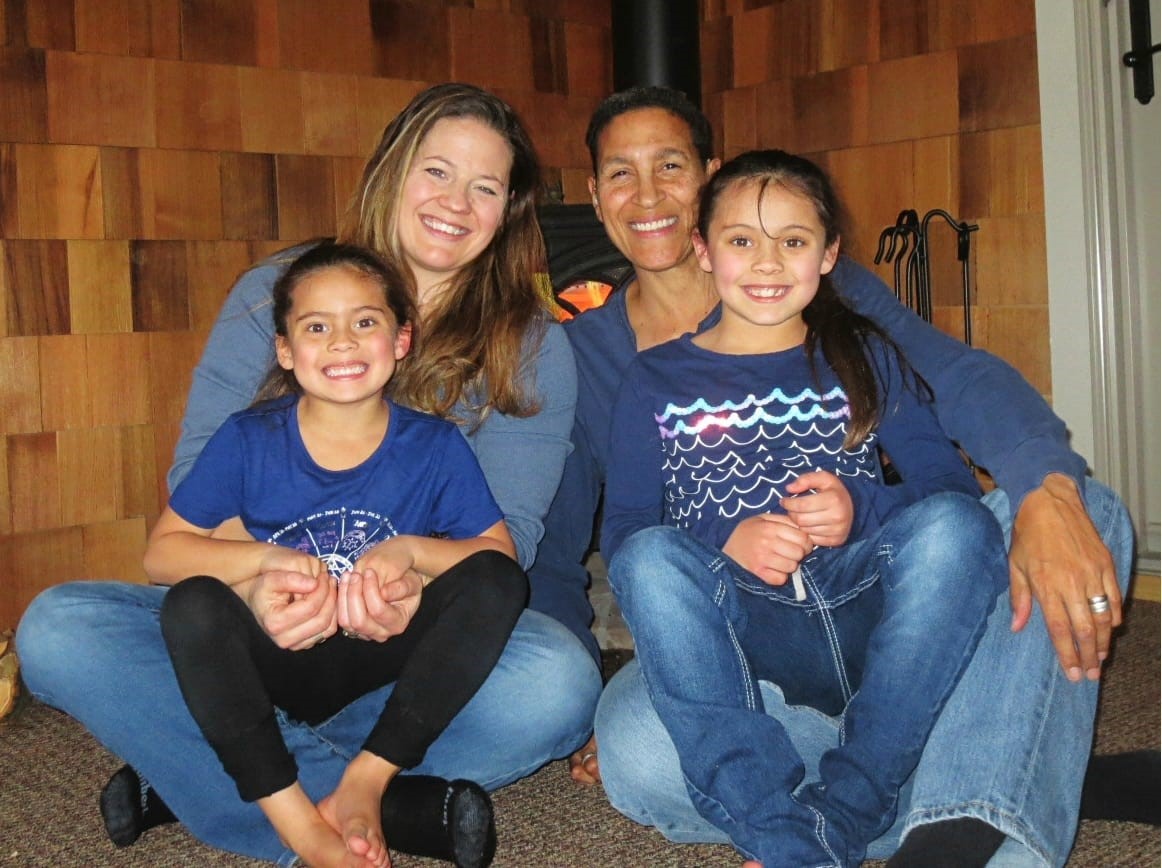
Edie Boyer ’89 hardly remembers a time in her life without sports. Growing up, she and her three brothers and two sisters played them all — baseball, basketball, softball, soccer, wiffle ball in the backyard, and street hockey in the driveway. Her love of sports is part of the reason Edie was inspired to give back to NDSU Athletics. In 2001, she established a scholarship endowment to support student-athletes competing in women’s sports at NDSU.
Edie, who lost 80% of her hearing before the age of one, said sports helped her overcome the insecurities and shyness she sometimes felt due to her hearing loss. With a hockey stick or basketball in hand, and her siblings by her side, it was so much easier to meet other kids and make friends.
When Edie began applying to colleges, she knew she would have to narrow her focus. She was torn between playing hockey, the sport she calls her first love, at a university out east or playing basketball at NDSU, a school much closer to her home in Hastings, Minnesota. Then, in 1984 she came to NDSU on a recruitment visit. She loved the engineering program and she met Amy Ruley, the women’s basketball coach and a major advocate for women’s athletics at NDSU.
“During that visit, I was able to see a bit of what NDSU stood for,” Edie said, “strong academic and athletic programs for men and women — and I saw myself fitting in and being a part of the Bison family for life.”
Under the guidance of Ruley — or “Coach,” as Edie refers to her — Edie and her teammates learned to adapt and communicate on the court. As a team, they used signals and developed plays. Edie’s hearing loss was never an issue. In fact, it may have improved another one of Edie’s senses — her sight.
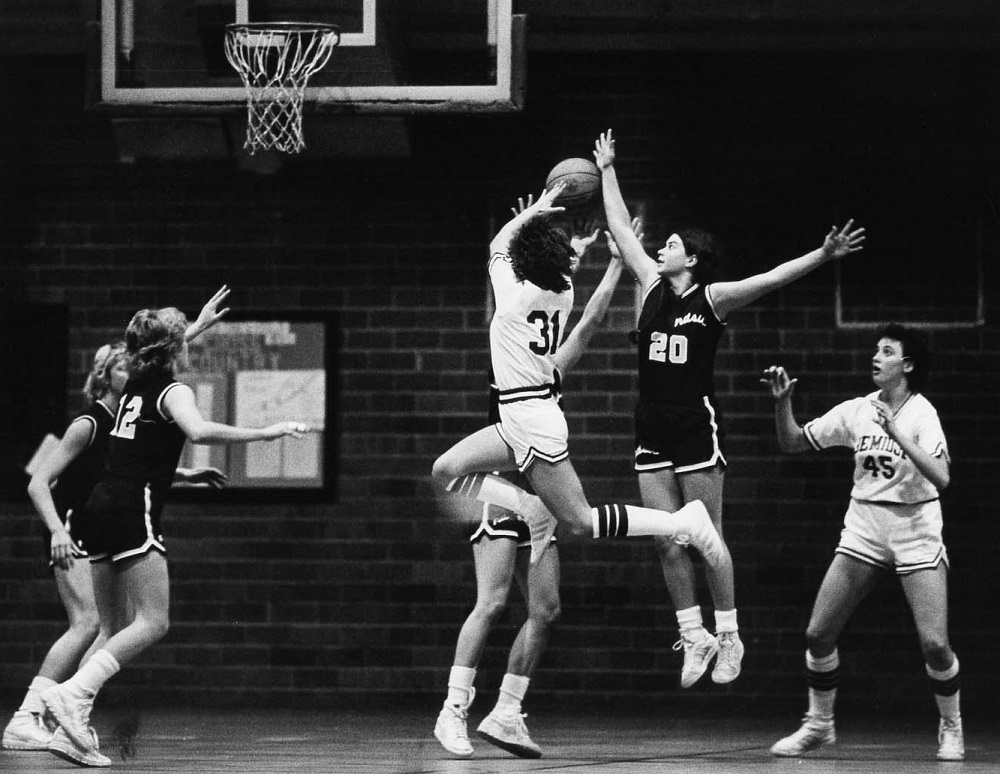
"People didn't expect this team from NDSU — 'cold, frozen country' — to make it to the Final Four for women's basketball. It was amazing. We were on ESPN. We had never had that kind of exposure before."
Edie Boyer '89
When people lose one of their senses early in life, research shows the pathways in the brain can reroute. In an individual with hearing loss, for example, the part of the brain that typically processes sound can process additional visual information. Perhaps that’s why one of Edie’s strengths on the court was her ability to visually assess, interpret, and anticipate people’s next moves.
“When I’m playing, I’m able to see a lot of what’s going on,” Edie said, “and I lip-read very well. I just have to remember to look all the time — look at my teammates, look at the coach, look around on the court.”
Edie and her teammates competed during a time of growth for women’s athletics at NDSU and beyond. The first Division II NCAA women’s basketball championship was held just two years before Edie started college, in 1982. That year, California State Polytechnic University, Pomona won the title.
Four years later, Edie and her teammates faced Cal Poly Pomona in the Division II NCAA championship game. It was a high stakes contest between a noteworthy team from the sunny west coast and a lesser-known team from the “frigid” Midwest. A headline at the time read “Fire vs. Ice.”
“People didn’t expect this team from NDSU — ‘cold, frozen country’ — to make it to the Final Four for women’s basketball,” Edie said. “It was amazing. We were on ESPN. We had never had that kind of exposure before.”
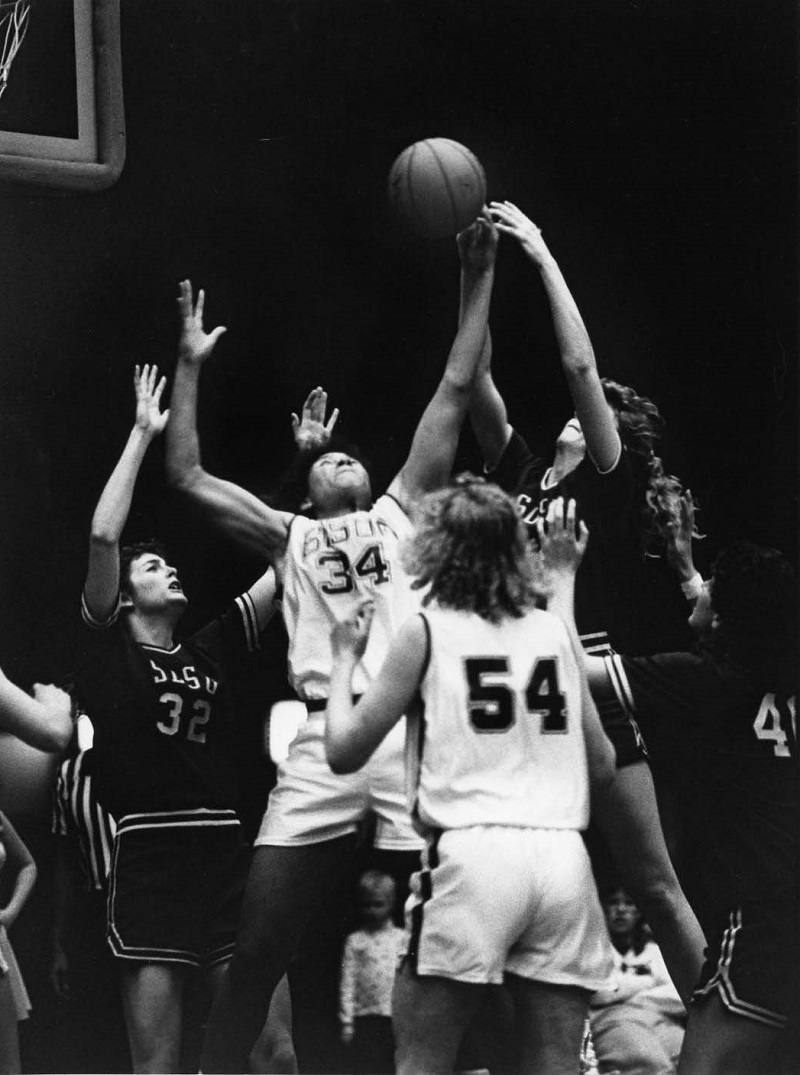
(Photo courtesy of NDSU Archives)
NDSU put up a good fight and earned second place that year. The final score was 70-63.
“Cal-Poly was a great team,” Edie said, “and the caliber of the competition was amazing.”
It was just one of the experiences at NDSU that taught Edie to carry herself high on and off the court, something Coach always reminded her team to do.
“Being a part of NDSU women’s basketball definitely made a big impact on my life and who I am now,” Edie said. “I had a wonderful family at NDSU — it was a family away from family. It really was.”
"I've always had that self-confidence in myself when I'm competing in sports, but it's my nature to do it quietly. For example, people have asked me, 'Hey, do you think you're going to make it to the Olympic Trials?' and I'd say, 'Well, that's my plan.' But I felt I knew. I knew I was going to get there because I had a plan to get there."
Edie Boyer '89
But basketball wasn’t the only sport Edie played at NDSU. She also competed in track and field, where she threw discus and shot-put. Throwing required a different skill set than basketball. Yes, Edie needed strength and coordination, but more than that, she needed rhythm.
“It’s hard to explain, but for any kind of throwing event, and especially with discus, you have to be able to feel that rhythm,” Edie said. “You start with a wind-up, slowly building up the tempo to a crescendo, and then you release and let the discus fly.”
Although she had to shift gears from basketball to track and field, the discus eventually became Edie’s bread and butter. After graduating from NDSU in 1989 with a degree in electrical engineering, Edie went on to train in discus with two former Olympian coaches and a strength coach at the University of Minnesota. There, she prepared to compete nationally and internationally — all while working a full-time job as an engineer at Xcel Energy.
“There’s a time and place for everything,” Edie said. “First, it was hockey, then basketball, then track. Track — I would say I was a late bloomer.”
She stressed the importance of having a plan, a strong work ethic, self-discipline, and a “cautious sense of self-confidence.” To be successful, Edie felt she needed to believe in herself while also being realistic.
“I’ve always had that self-confidence in myself when I’m competing in sports,” Edie said, “but it’s my nature to do it quietly. For example, people have asked me, ‘Hey, do you think you’re going to make it to the Olympic Trials?’ and I’d say, ‘Well, that’s my plan.’ But I felt I knew. I knew I was going to get there because I had a plan to get there.”
In 1995, Edie’s training sessions were going well, her meets were going well, and she made her way to the USA Track and Field National Championships in Sacramento, California. She had nothing to lose, she said. Her approach was just to compete and have fun.
"Sometimes you learn when you fall. You ask, 'What can I do differently?' and you go from there. Looking back on it, I'm glad I kept going."
Before stepping up to the circle in the discus cage, Edie practiced self-visualization, repeatedly running herself through the motions, imagining herself successfully making the throws. And she won.
“When it was all over, I was still pinching myself,” Edie said. “I couldn’t believe it.”
That summer, she also competed in the USA versus Great Britain dual meet and the 1995 World Championships.
“When I came back, my brothers kept me humble,” she added laughing, “Oh, they kept me grounded!”
The following year, Edie competed in the Olympic Trials. Going into the event, her approach was the same: she wanted to compete and have fun. But this time, her goals were loftier: she planned on making the Olympic team and retiring after the 1996 Olympics.
“Things were falling into place,” Edie said, “so I felt really good and ready to go, but when I got to the Olympic Trials, the outcome just wasn’t meant to be. It was a huge, huge disappointment for me.”
When she didn’t qualify, she decided to keep competing. She said she wanted to go out and finish her career on a high note.
“Sometimes you learn when you fall,” Edie said. “You ask, ‘What can I do differently?’ and you go from there. Looking back on it, I’m glad I kept going.”
Edie continued to throw discus until 2000, competing in the 1997 World Championships, 1998 Goodwill Games, and the 2000 Olympic Trials, among other events.
In 2006, she was inducted into the NDSU Bison Athletic Hall of Fame in recognition of her remarkable athletic achievements. She says her own experience at NDSU, which helped catapult her to success in both her athletic and professional careers, was made possible through scholarships and grants.
“It’s a privilege to be a student-athlete attending NDSU, especially when you’re getting financial aid, when you’re getting scholarships,” Edie said. “I never took it for granted.”
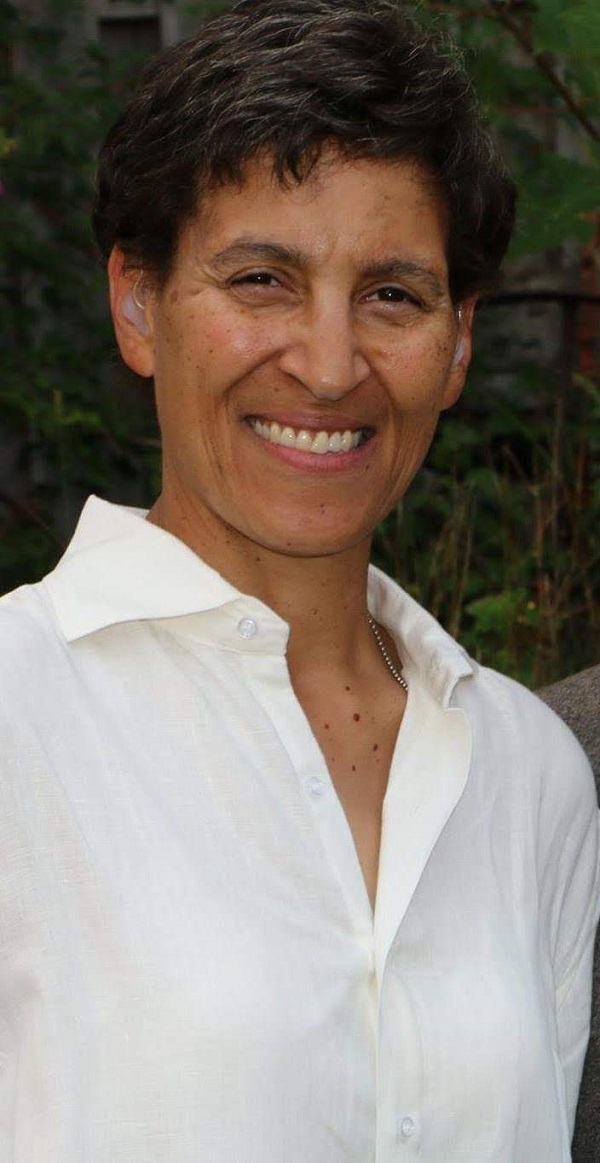
So, she established an endowed scholarship fund to help support student-athletes competing in women’s sports at NDSU.
“I believe NDSU has one of the top athletics programs to offer student-athletes, especially for female student-athletes,” Edie said. “By supporting student-athletes financially, they’ll have the opportunity to attend and compete in a top-notch program.”
Edie believes in investing in current student-athletes to show her appreciation and to offer exceptional opportunities to dedicated and ambitious young people who need financial assistance. Current and future gifts to the Edie M. Boyer Scholarship Endowment are making a difference for NDSU student-athletes through In Our Hands: The Campaign for North Dakota State University.
“I know there are people looking for help,” Edie said, “whether it’s financial or just someone looking out for them in general. I always believe if I can help in any way, it’s the least I can do.”
Edie remains involved in sports by coaching her daughters Evie (8) and Alex (6) in soccer and hockey, where, she said laughing, she wears a pair of ice skates she bought back in 1980.
_____
If you would like to contribute to the Edie M. Boyer Scholarship or receive information on how to fund your own endowment, contact Jack Maughan, NDSU senior associate athletic director, via email or Stefanie Kelly, director of athletic development, Twin Cities, via email.
North Dakota taxpayers are eligible for a 40% state tax credit for contributions to an existing endowment or upon establishing an endowment.
Share This Story
Related Stories
Bison Benevolence
Robert (Bob) '64, '70 and Suzanne '64 Lervick have always felt a special connection to Bison Athletics. Bob, a Life Trustee at...
Read More